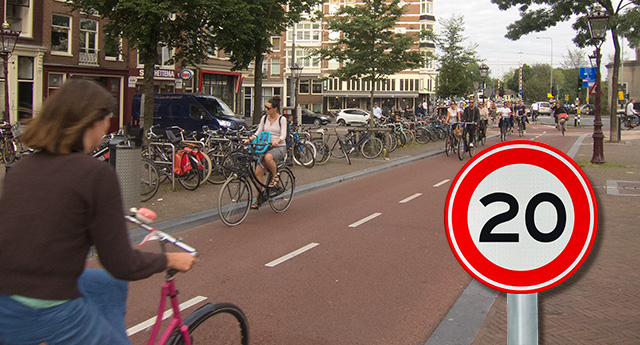Can Amsterdam impose a speed limit for e-bikes?
Being a cycling nation, the Dutch have come up with creative bike solutions to deal with the problems of traffic congestion and pollution. On a Dutch cycle path you’ll see all types of bikes, from the traditional oma fiets to the streamlined velomobile, from the bulky cargo bike to the speedy electric bike. But can our cycle paths cope with such a diverse fleet of bikes?
Since 2014 we have been following the heated debate about how the e-bike affects safety on our busy cycle paths. Now the city of Amsterdam wants to slow down fast e-bikes. Find out more in our series High speed on cycle paths. Part 5: Can Amsterdam impose a speed limit for e-bikes?
 Will there be a speed limit of 20 km/h for e-bikes in the near future? Photo © Holland-Cycling.com
Will there be a speed limit of 20 km/h for e-bikes in the near future? Photo © Holland-Cycling.com
Dangerous speed differences
In 2022 the Dutch Cyclists' Union (Fietsersbond) conducted a survey to find out how the ever growing number and diversity of e-bikes was affecting safety on the often narrow cycle paths in Amsterdam. The survey showed dangerous differences in speed between regular bikes and e-bikes. On average cyclists on regular bikes ride 17 km/h, while cyclists on e-bikes that have been illegally derestricted ride at least 13 km/h faster, sometimes even a speed of 42 km/h was measured!
Officially e-bikes are only allowed to have pedal support up to 25km/h in order to be classified as a bike. Above that, the pedal support stops working. But very often, e-bikes have been illegally derestricted to reach pedal support up to 30-32 km/h, sometimes even up to 37 km/h. Especially the popular VanMoof type e-bikes and fatbikes have more often than not been illegally derestricted, which is increasingly becoming a problem.
More accidents with e-bikes
These dangerous speed differences are cause for great concern, as in 2022 there was a 50% increase in the number of accidents with e-bikes. According to the Dutch Cyclits' Union e-bikers "often have too little control over their bike, hit other road users while overtaking or from behind. It also regularly happens that e-bikers take corners too fast and end up on the other side of the road."
Two thirds of Amsterdammers say they feel unsafe when taking part in the traffic in their city. To make cycling in Amsterdam safer, the Dutch Cyclists' Union advises imposing a speed limit of 20 km/h for e-bikes.
E-bikes not on cycle path
Amsterdam alderman Melanie van der Horst is shocked by the findings of the survey. "I think it's very important that Amsterdammers can cycle from A to B in an enjoyable and safe way." Amsterdam has already done a lot to improve its cycling infrastructure, like broadening cycle paths and making new 'bike streets' where cyclists' needs are prioritised over that of other road users.
Several years ago Amsterdam banned light mopeds from its cycle paths in an attempt to reduce the differences in speed and increase safety. Though this was a success, unfortunately the speed gap was soon filled by e-bikes that have been illegally derestricted.
Amsterdam is reluctant to ban all e-bikes from the cycle paths, as it is not considered a safe option for more vulnerable e-bike users, such as children or elderly cyclists. They do hope to entice less vulnerable, fast e-bikers to voluntarily leave the cycle paths and join the light mopeds and other faster traffic on the road.
New legislation
Amsterdam City Council acknowledges that through the arrival of electric vehicles such as e-bikes, cargo bikes, fatbikes and electric scooters, traffic is changing and new rules and regulations, such as a speed limit for e-bikes are required.
Amsterdam thinks a speed limit of 20 km/h for e-bikes is a good idea, but there are a few problems. Speed limits for each type of vehicle, such as bikes and e-bikes, apply for the whole of Holland and are determined by the Dutch national government. Amsterdam can't change national law.
Likewise it is currently not possible for Amsterdam to impose a speed limit of say 30 km/h for a road and, at the same time, a lower speed limit of 20 km/h for the cycle path adjacent to it. These rules also fall under national legislation. Amsterdam is now discussing the possibility of new legislation for electric vehicles with the Dutch government.
The debate continues
"The new rules should make sure electric vehicles are safe to use and can participate in traffic", Amsterdam City Council says. "That way manufacturers know which technical requirements their vehicles have to meet and it is clear in which stream of traffic vehicles belong. We are also looking for clear rules for derestricted e-bikes."
And so the heated debate on high speed on cycle paths still continues. It will be interesting to see whether there will be new legislation for electric vehicles any time soon and whether that will put an end to the debate for once and for all. We'll keep you posted!
High speed on cycle paths series:
|

